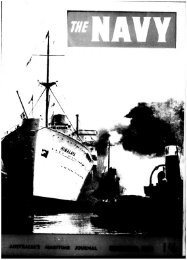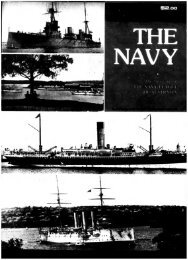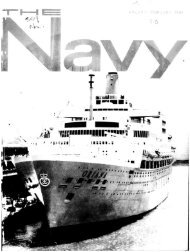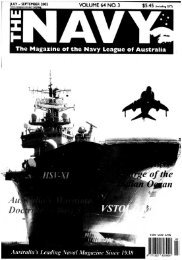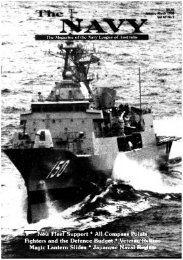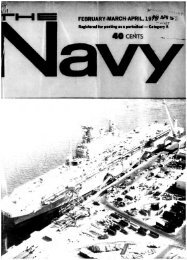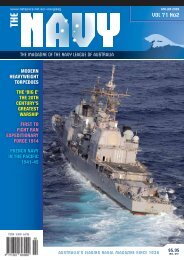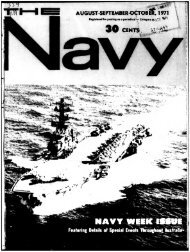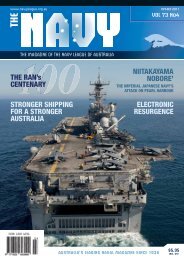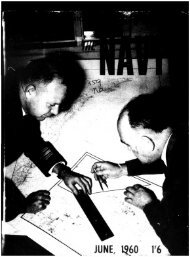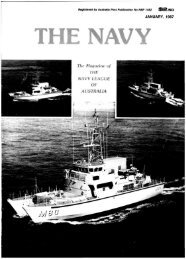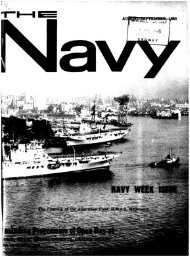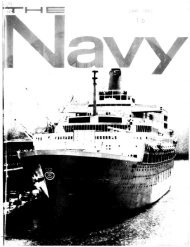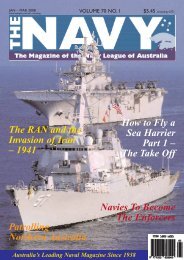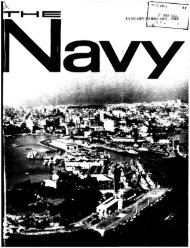Feb-Mar-Apr, May-June-July 1972 - Navy League of Australia
Feb-Mar-Apr, May-June-July 1972 - Navy League of Australia
Feb-Mar-Apr, May-June-July 1972 - Navy League of Australia
Create successful ePaper yourself
Turn your PDF publications into a flip-book with our unique Google optimized e-Paper software.
SPONSORLDBY<br />
GENERAL CREDITS LTD.<br />
AND<br />
A.F.G. INSURANCES LTD.<br />
Iflembers <strong>of</strong>:<br />
THE COMMERCIAL BA1%K OF<br />
AUSTRALIA LTD.<br />
GROUP OF COMPANIES<br />
Compliments to all Members from:<br />
MILLER ROPES<br />
TWINES<br />
AND TEXTILES<br />
Page Forty-«ix THE NAVY F«bru»ry/M«rch/<strong>Apr</strong>ll, <strong>1972</strong><br />
Address to the 44th annual Summer School <strong>of</strong> the University <strong>of</strong> Western<br />
<strong>Australia</strong>, by the Minister for the <strong>Navy</strong>. Dr the Honourable Malcolm G<br />
Mackay. B A . B D M P — 28 January <strong>1972</strong><br />
<strong>Australia</strong>'s<br />
Defence Outlook<br />
One <strong>of</strong> the prime requirements for<br />
any planner for national defence<br />
would seem to be a crystal ball. While<br />
every attempt is made to minimise<br />
the area <strong>of</strong> its use. both by the<br />
collection <strong>of</strong> intelligence and the<br />
development <strong>of</strong> our own knowledge<br />
and capability, nevertheless there is<br />
still a large ingredient <strong>of</strong> the<br />
unknown.<br />
My first presupposition is this. As<br />
this century draws to a close, the<br />
world will be more and more<br />
dominated by three super-powers,<br />
viz. the U.S.A.. the U.S.S.R. and<br />
China. Each will be equipped with a<br />
multiplicity <strong>of</strong> super-weapons, and<br />
will be able to unleash massive<br />
destruction. At the same time the<br />
technical capability <strong>of</strong> each for<br />
combating such an attack from<br />
another power will also increase<br />
enormously. Space too will become<br />
increasingly important as an area <strong>of</strong><br />
exploitation for military purposes.<br />
Following these three superpowers<br />
there is a second line <strong>of</strong><br />
major powers, which include the<br />
Europe <strong>of</strong> the future (if they can<br />
solve their internal difficulties to the<br />
point <strong>of</strong> presenting a united front).<br />
Japan and India — and pcssibly one<br />
or two other groupings <strong>of</strong> powers. It<br />
is only in the next area <strong>of</strong> still<br />
smaller powers that I would place<br />
<strong>Australia</strong> — and any discussion <strong>of</strong><br />
her defence requirements must take<br />
cognisance <strong>of</strong> this perspective.<br />
<strong>Australia</strong> alone could not withstand<br />
a determined onslaught by a superpower.<br />
and any system <strong>of</strong> defence<br />
against such a threat entails a<br />
guarantee <strong>of</strong> support from at least<br />
one other such power. Hence, in this<br />
region <strong>of</strong> the ultimate sanctions <strong>of</strong><br />
force in the world <strong>of</strong> tomorrow, the<br />
first line <strong>of</strong> <strong>Australia</strong>n defence is<br />
clearly political.<br />
<strong>Feb</strong>ruary/<strong>Mar</strong>ch/<strong>Apr</strong>il. <strong>1972</strong><br />
The Honourable Malcolm G. Mackay. BJL. B.D..<br />
Ph.D., M.P., Minister for tha <strong>Navy</strong>.<br />
AGGRESSION-BY-PROXY:<br />
However, while the super-powers<br />
themselves may find that, for some<br />
considerable time, the checks and<br />
balances <strong>of</strong> deterrence are so<br />
persuasive that they do not move<br />
directly, in terms <strong>of</strong> military action,<br />
there is nevertheless the developing<br />
strategy <strong>of</strong> aggression-by-proxy, i.e.<br />
<strong>of</strong> lesser powers undertaking<br />
military adventures under the aegis<br />
<strong>of</strong> a super-power. In a sense this is a<br />
brinksmanship type <strong>of</strong> conquest<br />
such as we have seen carried out in<br />
Cuba, in Central Europe and on the<br />
fringe <strong>of</strong> Asia. The vital question<br />
here for a defence planner is one <strong>of</strong><br />
"how far will the proxy go without<br />
involving the super-powers<br />
directly?" The struggle in Indo-China<br />
is a classic instance <strong>of</strong> this strategy.<br />
It does not nf»d Breshnev to tell us<br />
that there are smaller powers which<br />
lie within the specific zones <strong>of</strong><br />
influence and concern <strong>of</strong> each <strong>of</strong> the<br />
THE NAVY<br />
great powers. Other states however<br />
lie in a grey area, and it is with regard<br />
to the future <strong>of</strong> these states<br />
especially that much <strong>of</strong> the world's<br />
political energy will be directed in<br />
the period under review.<br />
POLITICS AND DEFENCE:<br />
I have stated that, in terms <strong>of</strong><br />
major defence decisions, politics is<br />
the determining factor. We should<br />
never forget that politics is primarily<br />
a matter <strong>of</strong> power and sectional<br />
advantage. Applied to the international<br />
scene it is useful to list<br />
those sanctions or incentives which<br />
are most effective in terms <strong>of</strong><br />
political involvement.<br />
The most important consideration<br />
is strategic or military value, as this<br />
bears directly on the self-defence<br />
and therefore the primary need <strong>of</strong><br />
the super-power. For this reason<br />
certain states, with little else to <strong>of</strong>fer,<br />
may nevertheless be held dearly as a<br />
valuable asset in the defence<br />
strategy <strong>of</strong> a greater power. By the<br />
same token the nuisance value" <strong>of</strong> a<br />
state or lesser power must also be<br />
taken into account, such as if the<br />
military capacity <strong>of</strong> that state is<br />
sufficient to make it a factor to-bereckoned-with<br />
in disturbing or<br />
embarrassing the strategic situation.<br />
Another factor bearing directly on<br />
the outcome <strong>of</strong> political consideration<br />
is the quantum <strong>of</strong> economic and<br />
industrial capacity <strong>of</strong> a country, i.e.<br />
the value <strong>of</strong> any lesser state, in<br />
economic terms, to a superpower.<br />
A nation's resources and<br />
overseas investments are clearly<br />
large considerations vitally affecting<br />
any major political decisions<br />
regarding its defence arrangements.<br />
This is an area where <strong>Australia</strong> must<br />
be particularly sensitive to her own<br />
national interest, as it may well<br />
prove that it is in this region as much<br />
as in any military one that her<br />
chances for significant support from<br />
her future allies may lie. The price<br />
and the benefit <strong>of</strong> such actions must<br />
continually be weighed and<br />
evaluated <strong>of</strong> course.<br />
Only after these matters have been<br />
mentioned would I place what I call<br />
Public Relations values, under which<br />
Psge Forty-seven



